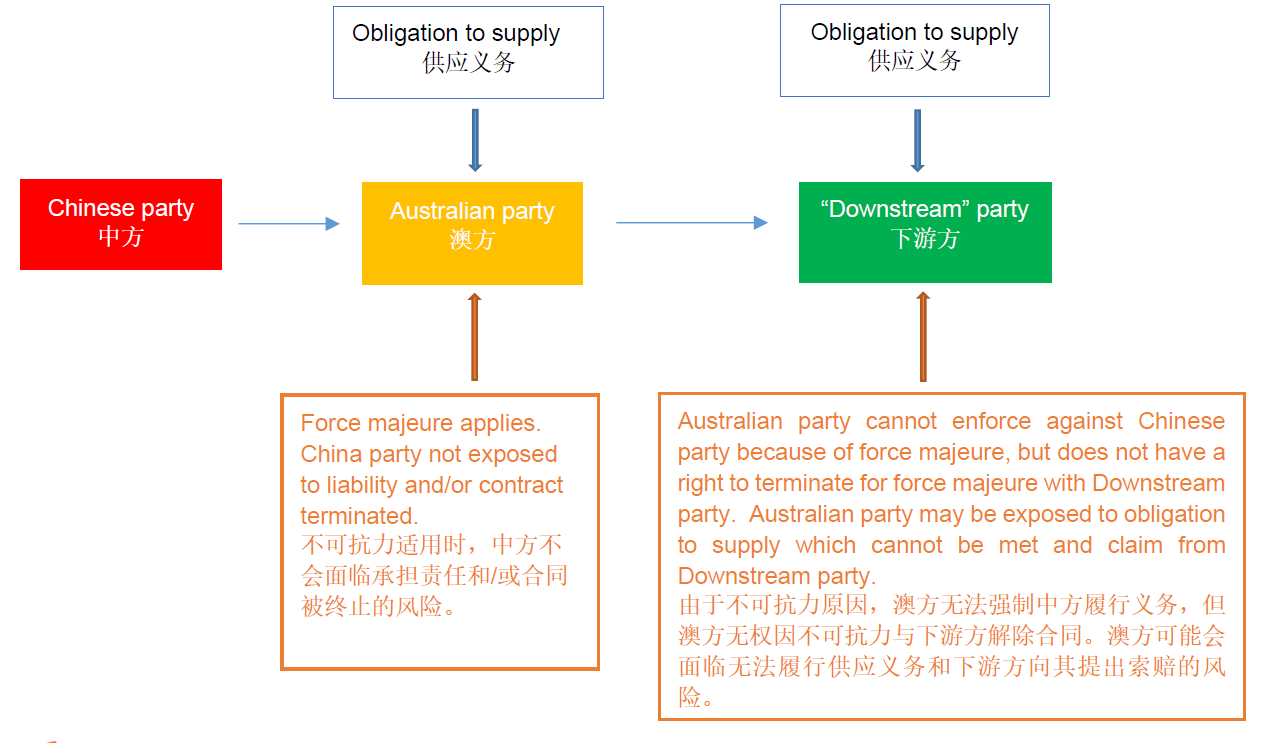The fast-spreading coronavirus, Covid-19, continues to present significant legal risks in business and trading relationships across the globe. In this uncertain environment of travel bans and trade restrictions, some counterparties may look for relief from liability for failing to meet contractual obligations by declaring the coronavirus as a force majeure event.
COVID-19新冠病毒的快速扩散,给全球的经济和商业贸易带来了重大的法律风险。在当前旅行禁令和贸易限制无法确定的环境下,合同当事人可能会主张新冠病毒构成不可抗力,从而免除无法履行合同的责任。

In this paper, we outline the Australian legal position on force majeure events and how that might apply in the case of the coronavirus outbreak.
本文概述不可抗力在澳大利亚的法律地位,以及在本次新冠病毒爆发事件中的适用。

The Concept of Force Majeure
不可抗力的概念
Force majeure under Australian law is a contractual form of risk allocation to potentially allow a party to a contract to be relieved from the consequences of failing to perform its obligations where that failure has been caused by specific events, normally events that are beyond the parties’ control. It is a contractual concept and therefore relies on the terms agreed between the parties. It is different from the common law doctrine of frustration.
按照澳大利亚法律,不可抗力是风险分配的一种约定形式,潜在地允许合同一方在由于超出当事人控制以外的特定事件导致合同义务无法履行时,对其后果可以免责。其是一个合同概念,因此依赖于双方商定的条款。其不同于普通法中的履约受挫原则。

Force majeure clauses provide a mechanism for dealing with events that interfere with specific contractual performance, but the contract still continues. If circumstances of force majeure exist, the affected party may be relieved from performance of a contract to the extent it was unable to perform due to the force majeure.
不可抗力条款提供了一种处理影响合同履行事件的机制,但合同本身仍在继续。如果存在不可抗力情形, 受影响的一方可在其因不可抗力无法履行范围限度内减轻合同履行的责任。
In Australian courts, the language of force majeure focuses on circumstances that are “unforeseeable”, external to the person claiming force majeure exists “making performance impossible” and not merely more difficult.
澳大利亚法院对不可抗力的关注点在于“不可预见”的情形,对于声称不可抗力一方而言,不可抗力的存在不仅使履行变得更加困难,而且“使履行变得不可能”。

Force majeure clauses can set out a list of events, or be drafted in more general terms to capture events that are simply outside of a party’s control. The clauses often outline the preconditions for the application of a force majeure declaration and the consequences which flow from it.
不可抗力条款可陈列一系列事件,或者使用概括术语来涵盖完全超出当事人控制以外事件。条款经常列出适用不可抗力声明以及由此产生后果的前提条件。

Examples of force majeure have included flooding which prevents mining operations from being carried out or civil unrest or protest which shuts down factory production preventing delivery of ordered goods.
不可抗力包括妨碍采矿作业开展的洪水或导致工厂停工而无法生产订单产品的国内动乱和示威。
Given the coronavirus is a new phenomenon, it is unlikely any such clauses in existing contracts will explicitly refer to it by name, but it may be captured by other general words such as “epidemic, virus, infestation or disease” or “events outside of a party’s control”.
鉴于新冠病毒是一种新现象,现有的合同条款不可能提及其名称, 但可能通过其他概括词汇来涵盖,比如流行病、病毒、感染、疾病,或者超出当事人控制以外的事件。
The language of force majeure clauses varies from contract to contract, so whether coronavirus qualifies as a force majeure event will depend on the exact language of the relevant contract. It should be noted that the World Health Organisation has not yet declared formal pandemic status on Covid-19, which may be a trigger point in some contracts.
不同合同对不可抗力条款有不同的语言表述,所以新冠病毒事件是否构成不可抗力还取决于相关合同的具体语言表述。需要注意的是,世界卫生组织还没有宣告COVID-19为大流行病,被宣告为大流行病可能会成为一些合同的触发点。

Most clauses will require the party wanting to claim the benefit of the clause to provide notice to the other parties of the occurrence of the force majeure event and provide information on the details of the event and the steps taken to remedy the event or overcome its effects. They also commonly stipulate that reasonable means to remedy the force majeure event are to be taken.
绝大部分此类条款都要求主张不可抗力的一方向另一方发送不可抗力发生的通知,提供事件的详细信息、已经采取的补救和克服影响的措施。一般,它们还会约定采取补救不可抗力事件的合理措施。
Scope and Effect of the Force Majeure Clause
不可抗力的范围和影响
As force majeure clauses are the product of a commercial agreement, in Australia, the scope and effect of such clauses depends on the construction and specific wording of the clause.
不可抗力是商业合同中达成的结果。在澳大利亚,此类条款的范围和影响取决于条款的结构和具体措辞。

In some civil code legal systems, such as China, principles like force majeure can be applied irrespective of private agreements. On 30 January, 2020, the China Council for the Promotion of International Trade announced that Chinese entities may apply for force majeure certificates for disputes with foreign trading partners arising from coronavirus. However, these certificates mostly indicate the occurrence of force majeure, they may not prove it for Australian law purposes and they will do little to protect parties in Australia relying on the delivery of goods to meet their own obligations, potentially leaving them exposed if they do not have rights to claim under their downstream contracts that force majeure exists.
在有些民事法系中,在中国,不论是否为私人协议,可以适用像不可抗力这类的原则。2020年1月30日,中国国际贸易促进委员会宣布中国实体可以申请不可抗力证明,以用于新冠病毒引起的对外贸易纠纷。但是,这些证明最多只是表明不可抗力的发生, 在澳大利亚法律下,它们可能无法证明,并且无法保护依靠货物交付履行义务的澳方,如果他们无权在下游合同中主张存在不可抗力,他们可能将临风险。
Whether a party can rely on a force majeure certification for downstream obligations will depend on the existence of any force majeure clause and an analysis of the relevant clause and the relevant facts, and furthermore whether an event such as certification by a Chinese authority is recognised by the counterparty.
一方是否可以凭借不可抗力证明来应对对下游的义务,将取决于不可抗力条款的存在、对相关条款和事实的分析,以及诸如中国政府出具的证明是否被对方认可的事实。
In Australia, a party seeking to rely on a force majeure clause is still required to prove there is a causal link between the force majeure event and the inability to perform the contract. Despite the occurrence of a force majeure, contracts will not be suspended unless it can be proven the ability to perform the primary contractual obligation has been affected. Businesses affected should therefore evaluate and document the impact of coronavirus on their functions and their ability to perform any relevant contractual obligations.
在澳大利亚,寻求不可抗力条款救济的一方仍然需要证明不可抗力和不能履行合同之间存在因果关系。尽管发生了不可抗力,合同也并不中止,除非能证明履行合同主要义务的能力受到了影响。因此,受影响的商业主体应当就新冠病毒对其运营和履行任何相关合同义务能力的影响进行评估和记录。
Where suspension of obligations because of a force majeure is not viable, parties may seek to terminate the contract entirely. Termination in these circumstances could lead to downstream liabilities where parties do not have “back-to-back” rights to also terminate, leaving them exposed to obligations they cannot fulfill because their upstream suppliers have claimed force majeure.
如果不能以不可抗力为由中止义务,当事人可以请求解除整个合同。在此等情形下终止合同,因其上游供应商已主张不可抗力,会使得在其不享有背靠背解除合同的权利时,面临无法向下游履行义务的风险。

沈静律师

沈静律师,上海至合律师事务所创始合伙人,先后获得华东政法大学学士和新加坡国立大学国际商法法学硕士学位,执业超过十年,长期从事外商投资、外资并购、国际贸易及涉外争议解决。上海市律师协会外事委员会委员、上海市律师协会一带一路专业研究委员会副主任、入选司法部全国千名涉外律师人才库。
李炳涛律师

Simon Venus律师

Simon Venus lawyer is a respected corporate and commerciallawyer with extensive expertise on a broad range of transactional and advisorymatters. He acts for Australian and international corporations and privateclients. He has been involved in many corporate projects including asset andshare sales and acquisitions, equity capital raisings and diligenceinvestigations. He has drafted and negotiated a broad range of commercialdocumentation including Government funding agreements, supply contracts,commercial collaboration and alliance agreements, service agreements.

 /
/